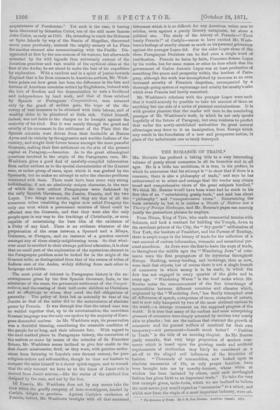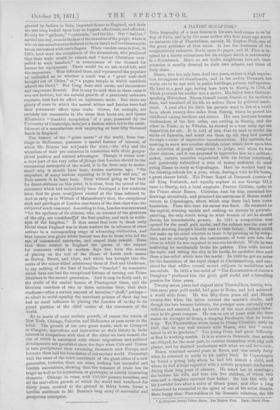THE ROMANCE OF TRADE.*
MR. Bounsus has prefixed a taking title to a very interesting volume of gossip about commerce in all its branches and in all ages. He is a trifle too ambitious, it is true, in his preface, in which he announces that his attempt is " to show that if there is a romance, there is also a philosophy of trade," and says be has endeavoured so to select and arrange that the reader may obtain broad and comprehensive views of the great subjects handled." We think Mr. Bourne would have been wiser had he stuck to his first idea of an " entertaining gossip.book," and said less about " philosophy " and "comprehensive views." Entertaining the book certainly is, but it is neither a Wealth of Nations nor a Theory of Foreign Exchanges, and Mr. Bourne's pages can scarcely justify the pretentious phrases he employs.
From Hiram, King of Tyre, who made commercial treaties with Solomon, and took a contract for building the Temple, down to the merchant princes of the City, the " dry-goods'" millionaires of New York, the bankers of Frankfort, and the Parsecs of Bombay, there is ample scope in the history of trade for the collection of a vast amount of curious information, romantic and sensational per- sonal anecdotes. As Jews wore the first to learn the ways of trade, so throughout the middle ages the " Wandering Jews" of toms merce were the first propagators of its mysteries throughout Europe. Banking, money-lending, and brokerage, then as now, were their first objects, but of course there is not a single branch of commerce in which money is to be made, in which the Jew has not engaged in every quarter of the globe and in every age. " Wandering Wares" is the head under which Mr. Bourne notes the commencement of the free interchange of commodities between different countries and climates which, originated by the Wandering Jew," has finally triumphed over all differences of speech, autagonism of races, obstacles of nature, and is now only hampered by two of the most civilized nations in the world,—a strange comment on the supposed progress of the world. It is true that many of the earliest and most enterprising pioneers of commerce were simply actuated by motives very nearly akin to plunder ; but are the nations that obstruct the growth of commerce and the general welfare of mankind for their own temporary—not permanent—benefit much better? " Fashion in Trade" is the title of an amusing chapter. As Mr. Bourne justly remarks, that very large proportion of modern com- merce which is based upon the growing needs and artificial requirements of civilization may fairly be considered as a set-off to the alleged evil influences of the frivolities of fashion. "Thousands of commodities, now looked upon as absolute necessaries of life, or only proper luxuries, have been brought into use by novelty-hunters, whose whim or wisdom has been imitated by others, until each newfangled fashion has given birth to an important trade." To take the very first example given, table-forks, which wo are inclined to believe the most severe jury would regard as " necessaries " to a minor, and which now form the staple of a most important industry, were oei- * The Romance of Trade. By J. R. Fox Bourne. London: Oaosell. 1871.
givated by fashion in Italy, imported thence to England, and their use was long looked upon here as foppish, effeminate, and affected, fit only for " gallants," " coxcombs," and the like. But " fashion carried the day, oven in the face of the thunders of the pulpit, where it was on one occasion even declared to be an insult to Providence not to touch one's meat with one's fingers. When coaches came in first, in 1535, loud were the complaints of the shoemakers, who predicted that their trade would be ruined, and " honest Christians com- pelled to walk barefoot," in consequence of the demand for leather for equipments. There would be no ash-wood left, said the carpenters. Wits ridiculed them, and represented the populace as undecided as to whether a coach was a " great crab-shell brought out of China," or:" a pagan temple in which cannibals adored the Devil." But Long Acre still exists, and shoemakers and carpenters flourish. But it may be said that in these cases it was not fashion, but the natural growth of a previously unknown requisite, that had its effect on legitimate trade. But there are plenty of oases in which the merest whims and fancies have had their permanent effect upon trade. Gloves, for example, are certainly not necessaries in the sense that boots are, and Queen Elizabeth's " thankful acceptation " of a 'pair, presented by the University of Cambridge, soon set a fashion which led to the estab- lishment of a manufacture now employing at least fifty thousand hands in England.
The history of the " great marts " of the world, from Car- thage to Melbourne, possesses a special feature of interest, of which Mr. Bourne has notlinade the most,—the why and the wherefore of their pre-eminence in connection with their geogra- phical position and natural advantages. Though it seems now- a-days part of the very order of ;things that London should be the commercial metropolis of the world, it is far from easy to under- stand why it should have been, twelve centuries ago, " the emporium of many nations repairing to it by land and sea," as Bede asserts it to have been. Even without going so far back for direct evidence on this point, it is clear, from the extent of the commerce which had undoubtedly been developed a few centuries later, that its germ mustahave existed at the time referred to. And as early as in William of Malmesbury's time, the exceptional rank and privileges of London merchants of the first class were the subject of much comment. According to him, London was renowned "for the opulence of its citizens, who, on account of the greatness of the city, are considered:of the first quality, and rank as noble- men of the kingdom." It thus seems that even in those early feudal times England was in these matters far in advance of other nations in a corresponding stage of advancing civilization, and that honour was given where honour was due to those who led the van of commercial enterprise, and reaped their reward. Even then there existed in England the germs of the respect for commerce which in modern days has been the means of placing on the roll of the House of Lords such names as Baring, Strutt, and Glyn, and which has brought into the ranks of the minor titled aristocracy those of Peel and Gladstone, to say nothing of the host of families " founded" by commerce which have not had the exceptional fortune of turning out Prime Ministers in the second generation. And it may be fairly said, to the credit of the mailed barons of Plantagenet times, and the frivolous courtiers of two or three centuries later, that their readiness—after a certain amount of harmless " chaff," perhaps— to admit to social equality the merchant princes of their day has had no small influence iu placing the London of to-day in its proud position of the chief centre of the commerce of the world.
As to marts of more modern growth, of course the names of New York, Chicago, Calcutta, and Melbourne at once occur to the mind. The growth of our own groat marts, such as Liverpool or Glasgow, marvellous and instructive as their history is, lacks interest in comparison with that of the cities we have named, the rise of which is associated with ethnic migrations and political developments not paralleled since the days when Colt and Teuton in turn precipitated their swarming thousands over Europe, and between them laid the foundation of our modern world. Connected with the name of the third mentioned of the giant cities of a now generation, however, there are none, nothing but mournful and terrible associations, showing that the romance of trade has its tragic as well as its mysterious, or grotesque, or merely interesting elements. Chicago in ruins, with 100,000 persons homeless, and all the marvellous growth at which the world had wondered for thirty years, crushed to the ground in thirty hours, farms terrible antithesis to Mr. Bourne's long story of successful and prosperous enterprise.



































 Previous page
Previous page